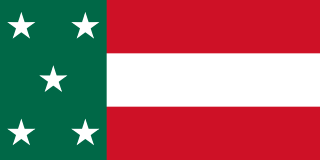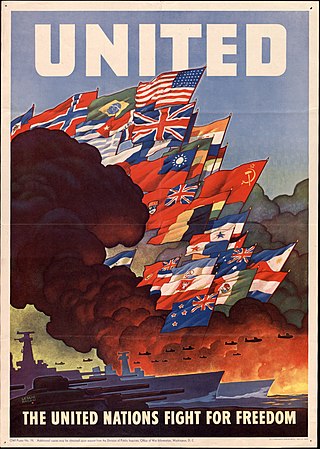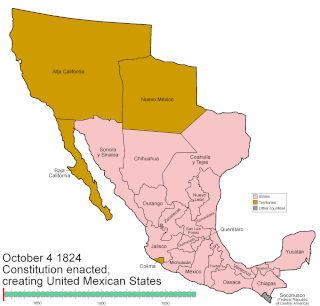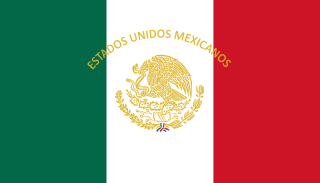Related Research Articles

The foreign relations of Mexico are directed by the President of the United Mexican States and managed through the Secretariat of Foreign Affairs. The principles of the foreign policy are constitutionally recognized in the Article 89, Section 10, which include: respect for international law and legal equality of states, their sovereignty and independence, non-intervention in the domestic affairs of other countries, peaceful resolution of conflicts, and promotion of collective security through active participation in international organizations. Since the 1930s, the Estrada Doctrine has served as a crucial complement to these principles.

Yucatán, officially the Estado Libre y Soberano de Yucatán, is one of the 31 states which, along with Mexico City, constitute the 32 federal entities of Mexico. It comprises 106 separate municipalities, and its capital city is Mérida.

The United Mexican States is a federal republic composed of 32 federal entities: 31 states and Mexico City, an autonomous entity. According to the Constitution of 1917, the states of the federation are free and sovereign in all matters concerning their internal affairs. Each state has its own congress and constitution.

A declaration of war is a formal act by which one state announces existing or impending war activity against another. The declaration is a performative speech act by an authorized party of a national government, in order to create a state of war between two or more states.

German Reich was the constitutional name for the German nation-state that existed from 18 January 1871 to 5 June 1945. The Reich became understood as deriving its authority and sovereignty entirely from a continuing unitary German Volk, with that authority and sovereignty being exercised at any one time over a unitary German "state territory" with variable boundaries and extent. Although commonly translated as "German Empire", the word Reich here better translates as "realm" or territorial "reach", in that the term does not in itself have monarchical connotations.

A declaration of war is a formal declaration issued by a national government indicating that a state of war exists between that nation and another. A document by the Federation of American Scientists gives an extensive listing and summary of statutes which are automatically engaged upon the United States declaring war.

The Inter-American Treaty of Reciprocal Assistance is an agreement signed in 1947 in Rio de Janeiro among many countries of the Americas. The central principle contained in its articles is that an attack against one is to be considered an attack against them all; this was known as the "hemispheric defense" doctrine. Despite this, several members have breached the treaty on multiple occasions. The treaty was initially created in 1947 and came into force in 1948, in accordance with Article 22 of the treaty. The Bahamas was the most recent country to sign and ratify it in 1982.

The Declaration by United Nations was the main treaty that formalized the Allies of World War II and was signed by 47 national governments between 1942 and 1945. On 1 January 1942, during the Arcadia Conference, the Allied "Big Four"—the United States, the United Kingdom, the Soviet Union, and China—signed a short document which later came to be known as the United Nations Declaration, and the next day the representatives of 22 other nations added their signatures.

Almost every country in the world participated in World War II. Most were neutral at the beginning, but only a relatively few nations remained neutral to the end. The Second World War pitted two alliances against each other, the Axis powers and the Allied powers; the Soviet Union served 34 million men and women, Germany 18 million, the U.S 16 million, Japan 9 million, and Great Britain 6 million. It is estimated that in total, 126 million people were mobilised during the war. It is generally estimated that a total of 72 million people died, with the lowest estimate being 40 million dead and the highest estimate being 90 million dead. The leading Axis powers were Nazi Germany, the Empire of Japan and the Kingdom of Italy; while the British Empire, the United States, the Soviet Union and the Republic of China were the "Big Four" Allied powers.

The Allies, formally referred to as the United Nations from 1942, were an international military coalition formed during World War II (1939–1945) to oppose the Axis powers, led by Nazi Germany, the Empire of Japan, and the Kingdom of Italy. Its principal members by the end of 1941 were the "Big Four" - United Kingdom, United States, Soviet Union, and China.

Mexico, officially the United Mexican States, is a country in the southern portion of North America. It is bordered to the north by the United States; to the south and west by the Pacific Ocean; to the southeast by Guatemala, Belize, and the Caribbean Sea; and to the east by the Gulf of Mexico. Mexico covers 1,972,550 km2, making it the world's 13th-largest country by area; with a population of almost 130 million, it is the 10th-most-populous country and has the most Spanish speakers. Mexico is organized as a federal republic comprising 31 states and Mexico City, its capital.

The Mexican Order of the Aztec Eagle forms part of the Mexican Honors System and is the highest Mexican order awarded to foreigners in the country.

Mexico has experienced many changes in territorial organization during its history as an independent state. The territorial boundaries of Mexico were affected by presidential and imperial decrees. One such decree was the Law of Bases for the Convocation of the Constituent Congress to the Constitutive Act of the Mexican Federation, which determined the national land area as the result of integration of the jurisdictions that corresponded to New Spain, the Captaincy General of Yucatán, the Captaincy General of Guatemala and the autonomous Kingdoms of East and West. The decree resulted in the independence from Spain.

The President of the Chamber of Deputies is the presiding officer of the Chamber of Deputies of Mexico. This position is analogous to the Speaker of the House in other legislatures. The incumbent president is Marcela Guerra Castillo. The president is elected for a one-year term.
The National Institute of Indigenous Peoples is a decentralized agency of the Mexican Federal Public Administration. It was established on December 4, 2018, though the earliest Mexican government agency for indigenous matters was created in 1948. It is headquartered in Mexico City and headed by Adelfo Regino Montes.

The national flag of Mexico is a vertical tricolor of green, white, and red with the national coat of arms charged in the center of the white stripe. While the meaning of the colors has changed over time, these three colors were adopted by Mexico following independence from Spain during the country's War of Independence, and subsequent First Mexican Empire.

The president of Mexico, officially the president of the United Mexican States, is the head of state and head of government of Mexico. Under the Constitution of Mexico, the president heads the executive branch of the federal government and is the commander-in-chief of the Mexican Armed Forces. The current president is Andrés Manuel López Obrador, who took office on 1 December 2018.

During World War II, a number of significant economic, political, and military changes took place in Latin America. The war caused considerable panic in the region over economics as large portions of economy of the region depended on the European investment capital, which was shut down. Latin America tried to stay neutral at first but the warring countries were endangering their neutrality. In order to better protect the Panama Canal, combat Axis influence, and optimize the production of goods for the war effort, the United States through Lend-Lease and similar programs greatly expanded its interests in Latin America, resulting in large-scale modernization and a major economic boost for the countries that participated.
César Emiliano Hernández Ochoa is a Mexican public official, lawyer and academic from Durango, Mexico. Hernández has a long trajectory inside the Mexican government, having worked in every Mexican federal administration since Ernesto Zedillo and received presidential appointments both from Andrés Manuel López Obrador and Enrique Peña Nieto. From December 1, 2018, until May 15, 2020, he served as National Commissioner at the Commission for Better Regulation. From February 5, 2014, until November 21, 2017, he served as Deputy Secretary of Energy for Electricity at Mexico's Department of Energy.
References
- ↑ Minster, Christopher (April 16, 2018). "Mexican Involvement in World War II". ThoughtCo.com. ThoughtCo. Retrieved June 4, 2018.
- ↑ Aviation History (June 12, 2006). "World War II: Mexican Air Force Helped Liberate the Philippines". HistoryNet.com. World History Group. Retrieved June 4, 2018.
- ↑ "Mexico: World War II, 1941–45". britannica.com. Encyclopædia Britannica. Retrieved June 4, 2018.
- ↑ "Decreto declarando que México se encuentra en estado de guerra con Italia, Alemania y Japón" (PDF). archivos.juridicas.unam.mx. National Autonomous University of Mexico/Senate of the Republic. Retrieved June 4, 2018.
- ↑ "Diario Oficial de México, Martes 2 de Junio de 1942". dof.gob.mx. Diario Oficial de la Federación. Retrieved June 4, 2018.